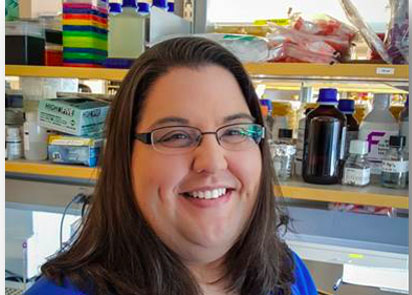By Stefan Tuomanen Welcome to the October Faculty Spotlight. This time we are featuring new Assistant Professor, Dr. Carrie B. Coleman.
Welcome to the October Faculty Spotlight. This time we are featuring new Assistant Professor, Dr. Carrie B. Coleman.
She comes to us from the University of Colorado, Anschutz Medical Campus where she completed her postdoctoral fellowship and has been at UAB for just over a month. An expert in oncogenic herpes viruses, specifically Epstein-Barr virus (EBV), Dr. Coleman focuses on understanding the role of T-cells in the formation of lymphomas.
EBV is a very successful virus infecting more than 90% of the world’s adult population. After initial infection, the virus enters a latent stage allowing EBV to persist for life. Dysregulation of this long-term infection, often occurring when the host immune system fails to properly control the infection, can lead to the development of lymphomas. Therefore, it is essential to identifying the cell types EBV infects in order to persist and in some cases cause lymphoma. There are two major types of EBV: types 1 and 2 and both are well established to infect B-cells. Dr. Coleman recently discovered that EBV Type-2 also infects T-cells. It is the investigation of the role T cells play in EBV Type-2 infections and lymphoma development that Dr. Coleman plans to pursue. Building on her work at the Kenya Medical Research Institute, her first UAB project will be to establish an in-vivo model to study EBV Type-2. The current level of research on EBV Type-2 and its biology are not nearly up to the level of EBV Type-1 leaving this area wide open. Dr. Coleman views this as a particularly exciting, especially for new students. “We really need to address some fundamentals and basic understanding of EBV Type-2,” she said. “It’s really nice for students joining the lab because there are a lot of directions research can take and a lot that is not yet understood.” Her ultimate goal in this area is to understand how the virus establishes long-term latency, where the reservoirs are, and expand understanding of molecular mechanisms beyond the model of EBV Type 1 to a new model of EBV persistence and oncogenesis.
Outside of her research, Dr. Coleman is an avid science advocate with a particular interest in teaching scientists how to better communicate with the public and policy makers. “We ignore that part of our job,” Dr. Coleman said. She believes all science professionals have an obligation to not only talk about the value of their work with people besides their peers, but also to do it well. At the University of Colorado Medical campus she was a co-founder of Project Bridge Colorado, an organization focused on training scientists in communication skills and facilitating public engagement. She hopes to establish a student-run University of Alabama chapter to continue her support for science education. This chapter would develop workshops for people to be able to communicate their science as well has having a political outreach program to help contribute to meaningful legislation.
Again, we are so pleased to welcome Dr. Coleman and her new lab to UAB Microbiology!